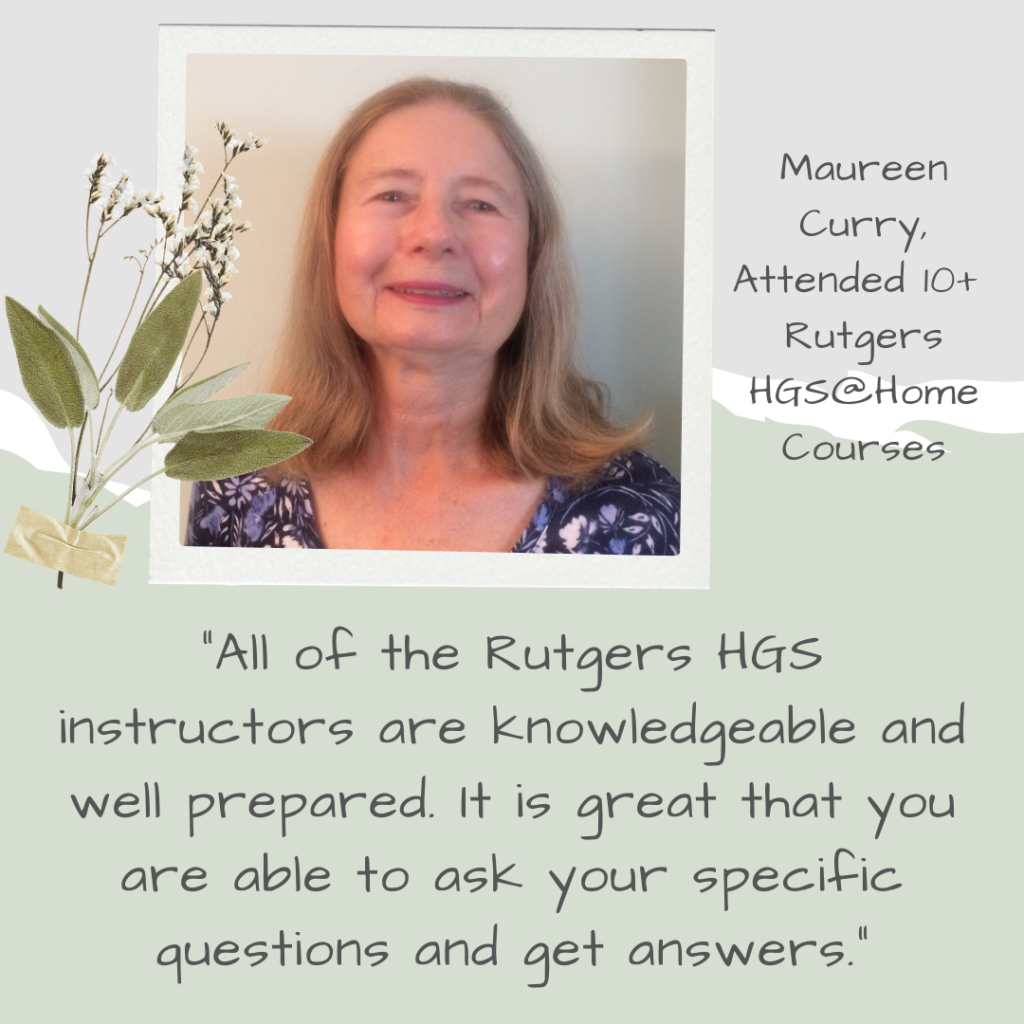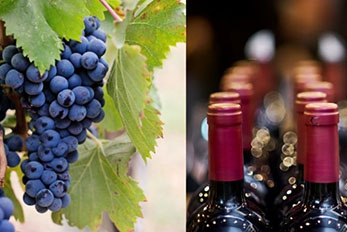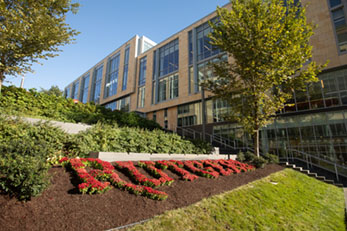Main Content
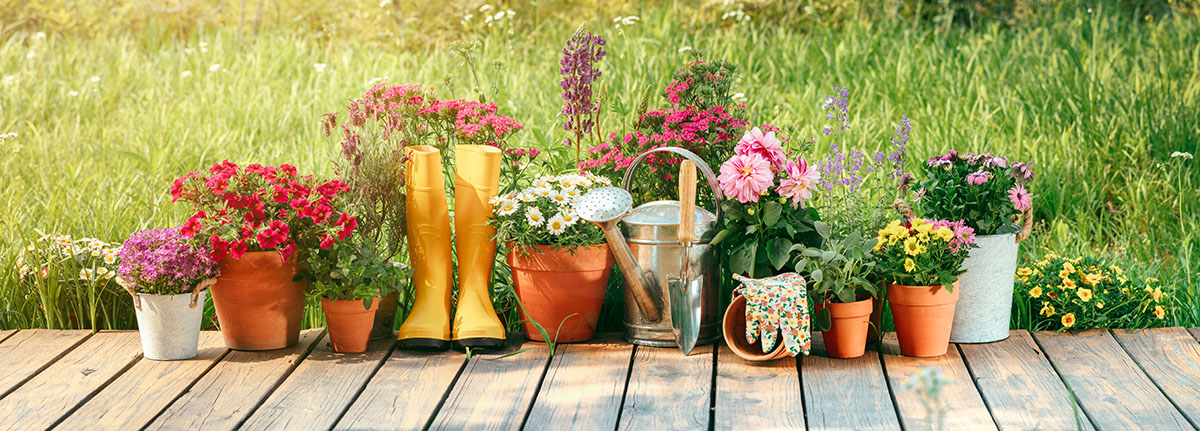
GIVE THE GIFT OF HOME GARDENERS SCHOOL!
Give the Gift of an Experience! Get into the holiday spirit by giving your loved ones something to treasure: a seat at the 44th Home Gardeners School (HGS).
Jump to: Register | Course Details | Overview | Instructor | Reviews | Policies | Contact Us | Related Courses | Join Email List
Register Now
Pay with Credit Card:
Pay with Check or Money Order:
Course Details
Course Name: Home Gardeners School
Course Code: AH0201HA25
Date: March 15, 2025
Time: 9:00 am – 4:00 pm (Check in will begin at 8:00 am in front of Hickman Hall.)
Location: Hickman Hall (89 George St.) and Loree Building (72 Lipman Dr.), New Brunswick, NJ (Directions & Map)
Workshop sessions are held in two buildings, requiring a short walk across a foot bridge.
Format: Live, Instructor-led
Registration Fee: $145 per person
Early Registration Discount Fee: $135 per person (expires February 16, 2025)
Master Gardener Discount* Fee: $125 per person (expires February 16, 2025)
*Master Gardener Certificate must be provided at the time of registration.
Registration Closes: March 12, 2025
Paying with a check, money order, or purchase order?
Payments should be made out to: Rutgers, The State University of New Jersey
Checks and money orders should be mailed to: Office of Continuing Professional Education, Attn: Registration Dept., 102 Ryders Ln, New Brunswick, NJ 08901-8519
Purchase Orders can be mailed to the address above or electronically sent to registration@njaes.rutgers.edu.
About Home Gardeners School
Whether you are a Master Gardener, a novice, or somewhere in between, the Rutgers Home Gardeners School has something for you! Each Home Gardeners School event is made up of multiple workshop sessions covering a wide array of horticulture topics and experience levels. This format allows you to select the workshops that are most relevant to your gardening interests and create your own customized schedule for a fun day of learning. The workshops are designed to inspire and prepare you for the growing season ahead.
Help Us Cultivate Great Connections in the Gardening Community!
Agenda
| 8:00 am – 9:00 am | Registration |
| 9:00 am – 10:15 am | Workshop Session 1 |
| 10:30 am – 11:45 am | Workshop Session 2 |
| 12:00 pm – 1:00 pm | Lunch |
| 1:15 pm – 2:30 pm | Workshop Session 3 |
| 2:45 pm – 4:00 pm | Workshop Session 4 |
Workshop Choices
Click here to download a printable workshop schedule.
Review the workshop descriptions below and select your top choices for each session. You will make your workshop selections in our online registration portal or when speaking to our registrars. Rutgers Home Gardeners School workshops are divided into beginner, advanced, and all level categories.
Each workshop is marked with a distinct symbol for easy identification:
Beginner
Advanced
All Levels
Session 1: 9:00am – 10:15am
Workshop 1: A Suburban Garden
Wolfram Hoefer, Horticulture Consultant & Research Associate, Center for Urban Environmental Sustainability (Contact Info & Bio)
There is more than just grass in the American home garden landscape. This workshop will discuss how to create a beautiful suburban garden. We will explore the social and environmental aspects of gardens in the suburbs and discuss what the first steps are to get your garden going. Get to know your neighbors through gardening!
Workshop 2: Home Landscape Propagation
Tom Molnar, Associate Professor, Department of Plant Biology (Contact Info & Bio)
When we think about propagating, trees and other woody plants don’t often come to mind. Join this talk to explore the ways you can propagate healthy woody plants in the home landscape.
Workshop 3: Composting for the Urban Gardener
Claudia Urdanivia, Agriculture & Natural Resources County Agent III, Rutgers Cooperative Extension of Essex County (Contact Info | Bio)
This workshop will focus on best practices for composting in urban communities. We will focus on passive and active compost methods and discuss which bins are appropriate for small spaces.
Workshop 4: Bring Out your Inner Green Thumb
Ruth Carll, Agriculture & Natural Resources County Agent III, Rutgers Cooperative Extension (Contact Info | Bio)
Have you tried to grow house plants but did not have success? Take this introduction to growing house plants to learn some basic best practices and identify a few indoor superstars to try.
Workshop 5: Comprehensive Guide to Vermicomposting at Home
Belinda Chester, Consumer Horticulture Program Associate II; Rutgers Master Gardener Program Coordinator, Rutgers Cooperative Extension of Atlantic County (Contact Info)
This workshop will provide you with an overall guide to vermicomposting. We will review recommended supplies, harvesting castings, troubleshooting, and observations. You will have an option to purchase a vermicompost bin which will include a starter pack of worms.
Workshop 6: Turfgrass Lawns
Bradley Park, Laboratory Researcher, Dept. of Plant Biology (Contact Info | Bio)
Perennial turfgrass cover provides many benefits – most notably preventing soil erosion. In situations where natural turfgrass is not well adapted and bare soil persists, soil erosion may occur, and weeds can encroach. This presentation will explore site specific turfgrass selection decisions.
Workshop 7: Raingarden as Green Infrastructures
Holly Nelson, Landscape Architecture Program Director and Associate Professor of Practice, Center for Urban Environmental Sustainability (Contact Info & Bio)
Rain gardens capture, filter, and infiltrate to reduce stormwater runoff. They can also be gardens for people, wildlife, pollinators, and other beneficial insects. This workshop will review basic design principles and exemplars, and help you understand some barriers to success.
Workshop 8: Invasive Weeds in NJ
Lynn Waclawski, Home Horticulture Program Assistant, Rutgers Cooperative Extension of Warren County (Contact Info)
Weeds may not sound like a fun topic, but this talk will change your mind! This presentation explores what an invasive species is and how they affect the ecosystem. Then you’ll learn about 6-7 specific invasive plants, how to identify them, and their management.
Workshop 9: Horticulture Therapy: Tools & Techniques
Elisabeth Black, Teaching Assistant, Department of Psychology (Contact Info)
This workshop will provide you with an overview of three gardening programs. Two school-based gardens for high school students and a garden at a group home for adults with deaf blindness. This presentation will introduce tools designed for people with physical disabilities, gardens designed to be used by people with cognitive and sensory disabilities and provide lessons for people with all abilities.
Workshop 10: Grow Your Own Garlic
Justine Gray, Agriculture & Natural Resources Program Associate I, Rutgers Cooperative Extension of Mercer County (Contact Info | Bio)
This workshop will cover everything from choosing your garlic to when to fertilize. We will dive deep into this specialty crop that you can never have too much of!
Session 2: 10:30am – 11:45am
= Beginner
= Advanced
= All Levels
Workshop 11: Basic and Straw Bale Gardening
Lynn Waclawski, Horticulture Program Assistant, Rutgers Cooperative Extension of Warren County (Contact Info)
This workshop will explore the benefits of gardening. Our instructor will teach you how to choose a site, discuss soil fertility, help you determine transplants vs seeds, and go over the steps of monitoring and preventing pests/disease. This is great chance for beginners to gain some basic knowledge and get started on the right foot!
Workshop 12: Being Smart with Chemicals
Timothy Waller, PhD, Agriculture & Natural Resources County Agent III, Rutgers Cooperative Extension of Cumberland County (Contact Info)
Pesticides often serve a valuable role if one understands how and when to properly use them. In this workshop, we will discuss the different types of pesticides one may encounter in the world of home horticulture. Safe handling, use patterns, pesticide classes such as herbicides, insecticides, and fungicides, difference between organic / inorganic, difference between labeled and home-brew, and decision-making tools will be discussed.
Workshop 13: Lawn and Landscape Care Without Pesticides
William Hlubik, Agricultural and Resource Management Agent, Rutgers Cooperative Extension, Cumberland County (Contact Info & Bio)
This workshop will discuss proper plant selection and management techniques that can eliminate pesticide use for many home landscapes.
Workshop 14: Nature’s Marketing Experts: Flowers!
Ruth Carll, Agriculture & Natural Resources County Agent III, Rutgers Cooperative Extension (Contact Info | Bio)
Flowers are the most expensive thing a plant can produce. There is no room for errors either as the success of flowers can literally be life or death! Join Ruth Carll, Rutger’s State Leader of Consumer Horticulture, to explore the intricate and precise ways that plants use flowers to communicate with their partner pollinators. The messages in a bed of flowers are as complex as the Las Vegas strip! You will never look at your landscape the same way again!
Workshop 15: Integrated Pest Management (IPM) for the Backyard Orchard
Janine Spies, Agriculture & Natural Resources County Agent III, Statewide Program Leader in Fruit IPM (Contact Info | Bio)
This workshop will teach you how to identify key pests and diseases of tree fruit and use integrated pest management (IPM) for a sustainable approach to reduce damage from pests.
Workshop 16: Weed Management in Lawns and Ornamental beds
Matt Elmore, Associate Extension Specialist, Department of Plant Biology (Contact Info & Bio)
Weeds often disrupt perennial turfgrass lawns and ornamental beds. We will learn more about these weeds – why and how they invade these systems. We will also learn about weed life cycles and holistic strategies to control them.
Workshop 17: Creating a Woodland Garden
Jean Epiphan, Agriculture & Natural Resource Agent (Assistant Professor), Center for Urban Environmental Sustainability (Contact Info & Bio)
This workshop will explain how to plant native indigenous species by plant community type for woodland or forested areas to improve overall landscape sustainability, habitat, and ecological value. It includes an overview of means in the plant world, how to know what plants belong in your woodland site, wetland indicator status, and a journey by layer (stratum) of vegetation from tree saplings and tall shrubs to perennials and small graminoids. We will also review how to keep native indigenous woodland plants healthy, by improving soil conditions naturally.
Workshop 18: Why Native Plants
Bill Errickson, Agriculture & Natural Resources County Agent III, Rutgers Cooperative Extension of Monmouth County (Contact Info)
Native plants are gaining increasing popularity in our landscapes and in our local nurseries. Why should we grow native plants when we have unprecedented access to unique plants from all over the world? This workshop will highlight scientific research reports that have focused on evaluating the ecosystem services provided by native plants and how this pertains to our collective landscapes.
Workshop 19: Horticulture for the Health of It
Joel Flagler, Agriculture & Natural Resources County Agent I, County Extension Dept. Head, Rutgers Cooperative Extension of Bergen County (Contact Info | Bio)
Individuals with mental, physical, and psycho-social challenges can have success with plants that lead to other successes in their lives. Plants respond to anyone, when given the basics of care. Modified tools, well selected plant-related activities, and adaptive garden-like settings can ensure that all participants have meaningful experiences with indoor and outdoor plants any time of the year.
Workshop 20: Making the Most of Your Raised Bed Garden
Claudia Urdanivia, Agriculture & Natural Resources County Agent III, Rutgers Cooperative Extension of Essex County (Contact Info | Bio)
Raised beds have many benefits and are great for beginners and seasoned gardeners alike. Learn to make the most of your raised garden bed by growing intensively and using best practices such as succession planting.
Lunch: 11:45pm – 1:15pm
12:00pm – 1:00pm OPTIONAL Lunch and Learn: RU READY Beginner Farmer Program
*Seating first come, first served. No registration for this talk
William Hlubik, Agricultural and Resource Management Agent, Rutgers Cooperative Extension, Middlesex County (Contact Info & Bio)
The Rutgers RU Ready to Farm program is an RCE NJAES statewide training program for anyone interested in starting their own small farm. Over the past 3 years, over 188 students have enrolled in the program and are in different stages of completion. The RU Ready to Farm program was recently featured nationally on ‘Eye on America’ on CBS evening news with reporters Meg Oliver and Norah Odonnel. Come see what all the excitement is about and learn how to take your gardening desires to the next level.
Session 3: 1:15pm – 2:30pm
= Beginner
= Advanced
= All Levels
Workshop 21: Demystifying Soil Testing
Rebecca Magron, Horticultural Consultant and Research Associate, Rutgers Cooperative Extension of Hunterdon County (Contact Info)
This workshop will teach you how to read soil test results and provide solutions to common problems that the Rutgers Master Gardener Helpline encounters.
Workshop 22: Practical Organic Steps to Soil Fertility
Joseph Heckman, Extension Specialist in Soil Fertility, Department of Plant Biology (Contact Info & Bio)
This workshop will go over how soils can be made fertile and productive using a variety of naturally available non-commercial nutrient sources in association with ecological cultural practices.
Workshop 23: Basics for Breathtaking and Healthy Container Gardens
Irene Wanat, Gardening Consultant, Master Gardener (Bio)
Learn about one of the hottest trends in gardening – growing plants in a wide variety of containers. A container garden can enhance an entranceway, beautify a deck or patio, or add elegance around a pool. We will discuss how to choose your container, how to design and create exciting and exuberant colorful plantings with smart plant choices and learn how to maintain your masterpiece throughout the gardening season.
Workshop 24: Setting Your Trees Up for Success
Maxine Marvosa, Assistant Director, Horticulture, Rutgers Gardens (Bio)
This talk will cover how to choose the right plant from the nursery and the care you will need to provide when you take your new tree home. Maxine will share proper tree planting techniques, pruning of young trees, and how to successfully establish new trees in your home landscape.
Workshop 25: Greenhouses for Homeowners and Gardeners
A.J. Both, Extension Specialist, Department of Environmental Sciences (Contact Info & Bio)
This workshop will help attendees select an appropriate size and style of greenhouse to fit their needs, find the best place to locate it, and decide whether to build it themselves or hire a contractor to do so. The presentation will review important greenhouse components such as framing and glazing materials, bench layout, heating and ventilation systems, supplemental lighting, irrigation systems, and other useful greenhouse systems.
Workshop 26: Diagnostic Tips for the Problem Lawn
Rich Buckley, Director,Plant Diagnostic Lab and Nematode Detection Service, Ralph Geiger Turfgrass Education Center (Contact Info | Bio)
Turfgrass problem solving is a necessary skill for all turf managers—professional and enthusiast alike. Every turf manager needs the tools to quickly rule out possibilities and narrow focus to solve problems. This workshop will review basic plant pathology concepts and emphasize how to use these ideas to accurately diagnose turf problems in the field. A step-by-step diagnostic process using visual cues and environmental clues will be discussed.
Workshop 27: Water Gardening and Tub Ponds: The Big Easy
Ted Coletti, Author, Tub Pond Handbook (Bio)
The backyard pond, with its required space, excavation, maintenance, and expense, discourages many homeowners from taking the plunge. The solution is the free-standing patio or “tub pond”. Get your feet wet with a new world of foliage, flowers, fragrances (and optional fishes) with little maintenance and a lot less space.
Workshop 28: Native Plant Alternatives to Invasive Plants in the Landscape
Michele Bakacs, Agriculture & Natural Resources County Agent II, Rutgers Cooperative Extension of Middlesex County (Contact Info & Bio)
Some common horticultural plants such as barberry, burning bush, silvergrass, and butterfly bush are considered invasive in our forests and native habitats. Learn which species are critical to remove from your landscape and which native plants that can be used as replacements. Learn which native plants are deer resistant and will thrive under different conditions, be it wet, dry, sunny or shady; there is a native plant for every situation.
Workshop 29: Mosquitoes in your Garden: Sources, Challenges, and Solutions
Dina Fonseca, Professor in Entomology, Dept. of Entomology (Contact Info & Bio)
In this workshop, you will learn about the different mosquitoes in your garden and the challenges and opportunities they pose. This fact-based presentation will guide you through effective solutions to prevent bites which will ensure a more enjoyable gardening experience.
Workshop 30: Getting Started with Edible Landscaping
Lauren Errickson, Director, Rutgers Gardens (Contact Info | Bio)
Have you ever wondered what types of plants can beautify your landscape AND produce a tasty, nutritious harvest? Learn how to set yourself up for success with a home-scale edible landscape. We’ll cover site selection through plant choices, installation, and harvest! As a bonus, this talk will weave together aspects of science and folklore to introduce you to ecosystem benefits and traditional uses of edible landscape plants.
Session 4: 2:45pm – 4:00pm
= Beginner
= Advanced
= All Levels
Workshop 31: Common Lawn Care Mistakes Homeowners Make
Jim Murphy, Extension Specialist, Department of Plant Biology (Contact Info & Bio)
Join this interesting presentation that will demystify lawn care! You’ll learn about common mistakes, why they hinder lawn success, and how to choose an appropriate strategy for better results.
Workshop 32: Mycorrhizal Associations with Plants and Their Field Application
Rebecca Magron, Horticultural Consultant and Research Associate, Rutgers Cooperative Extension of Hunterdon County (Contact Info)
This workshop will provide you with an overview of mycorrhizal associations with plant roots and discuss mycorrhizae applications.
Workshop 33: New Jersey Laws and the Home Gardener
Sal Mangiafico, Agriculture & Natural Resources County Agent II, County Extension Dept. Head, Rutgers Cooperative Extension of Cumberland County (Contact Info)
Kaylynn Hyson, Rutgers Master Gardener Coordinator and Home Horticulture Educator, Rutgers Cooperative Extension of Cumberland County (Contact Info)
This workshop will review the many state and municipal laws affecting the home gardener and landscaper. We will discuss municipal tree removal and replacement ordinances, the statewide turfgrass fertilization law, stormwater harvesting, restricted use pesticides, residential livestock, and noxious weeds.
Workshop 34: Rutgers Gardens: Past, Present, and Future
Lauren Errickson, Director, Rutgers Gardens (Contact Info | Bio)
Rutgers Gardens, the official botanic garden of Rutgers, the State University of New Jersey, includes designed gardens, plant collections, farms, natural areas, and a farmers’ market. Join this session to hear about the evolution of Rutgers Gardens from its agricultural roots to present-day public and educational gardens and learn what’s in store for an exciting future as Rutgers Gardens grows. Images collected over the last century, colorful present-day garden photos, and tales of plant folklore woven into this presentation will help tell the story of Rutgers Gardens, leaving you excited and inspired for your own spring gardening endeavors.
Workshop 35: Building a Pollinator’s Paradise
Angela Monaghan, Master Gardener Program Coordinator, Rutgers Cooperative Extension of Middlesex County (Contact Info)
Pollinators are essential to our ecosystem, but populations have declined in recent years. This workshop will explore garden features that support biodiversity, pollination of edible crops, and encourage biological control of vegetable pests while beautifying your landscape.
Workshop 36: Strategies for Insect Pest & Disease Management in Lawn & Landscape Turf
Ming-Yi Chou, Assistant Extension Specialist, Department of Plant Biology (Contact & Bio)
Albrecht Kopenhofer, Extension Specialist in Entomology, Department of Entomology (Contact Info)
This presentation will talk about strategies to reduce lawn disease pressure using examples of some of the most common turfgrass diseases such as summer patch, brown patch and dollar spot. Attendees will learn about good cultural practices, including proper fertility, irrigation, cultivation, soil pH, and mowing practices, which are critical for a successful disease management program.
Workshop 37: Glorious Shade
Irene Wanat, Gardening Consultant, Master Gardener (Bio)
Shade is one of the most common garden situations homeowners have, but with the right plant knowledge, you can triumph over challenging areas and learn to embrace shade as an opportunity instead of an obstacle. This presentation will cover the benefits of shade and how to make the most of it. Learn how to determine what type of shade you have, how to choose the right plants for the space, and design and maintenance tips that are key to growing a successful shade garden.
Workshop 38: Emerging Problems in the Urban Landscape
Rich Buckley, Director,Plant Diagnostic Lab and Nematode Detection Service, Ralph Geiger Turfgrass Education Center (Contact Info | Bio)
If it’s not one thing, it’s another! Invasive insect pests and diseases have wreaked havoc on ash, elm, chestnut, hemlock, and many others, wiping some of them almost completely from American landscapes and forests. This talk covers several new and emerging diseases and insect pests spreading into the mid-Atlantic and northeast regions. Diagnostic tools, organism biology and ecology, scouting and monitoring techniques, and current concepts in integrated control that includes all known cultural, biological, and chemical management strategies will be covered.
Workshop 39: Become Tick Confident: Tick ID, Disease Risk, Myths, and Real Tick Bite Prevention Tools
Emily Fontaine, Program Associate, Department of Entomology (Contact Info)
Being in the know about tick identification, tick bite prevention, tick removal, and tickborne disease risks is essential to feeling confident during a tick encounter! Come learn about these topics and more to help yourself and others become more tick confident!
Workshop 40: Growing an Organic Vegetable Garden from Seed to Harvest
Alex Sawatzky, Assistant Director, Rutgers Gardens (Bio)
This workshop will teach you how to prepare your garden for spring planting. Our instructor will show you how to start a successful vegetable garden from seed, share the pros and cons of growing your own transplants, discuss timing for a successful harvest, and go over limitations and key considerations such as supplies and infrastructure needs.
Home Gardeners School Instructors
Rutgers Home Gardeners School instructors include professionals in the horticultural, ecological, and landscape design industries, faculty and staff from Rutgers Cooperative Extension and the School of Environmental and Biological Sciences, Master Gardeners, and other experts with unique experience and skill sets. Their instruction will provide you with valuable tips that come from decades of academic studies, scientific research and hands-on experience, providing you with the opportunity to learn from the best in the business.
Student Reviews
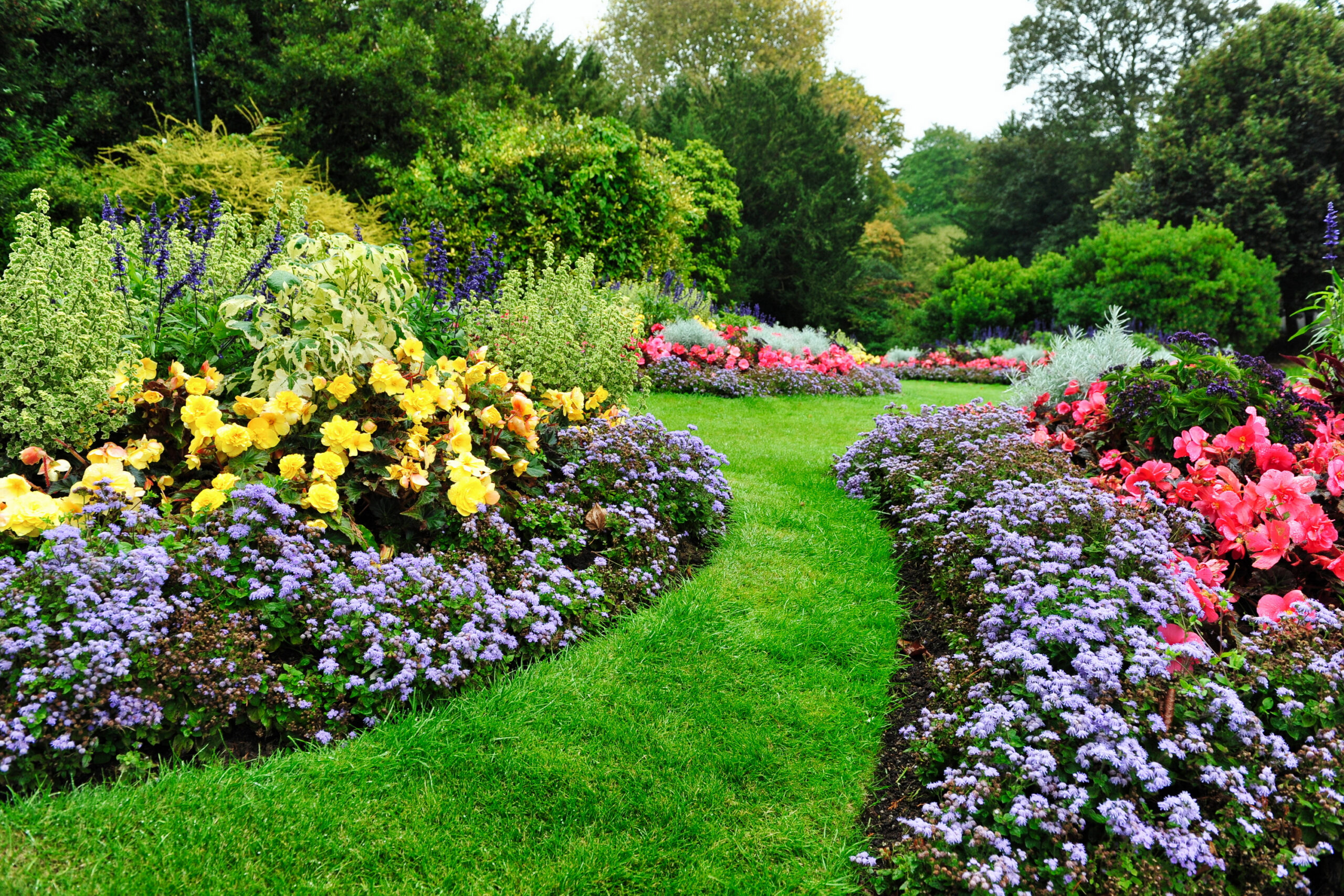
– Past Participant
– Maureen Curry
– Past Participant
Course Requirements and Policies
 Meals
Meals
Coffee and tea will be available in the morning.
Lunch is not included. An optional box meal may be purchased for $18 when you register. Pre-ordered lunches will be served in the courtyard of Hickman Hall. There will be a variety of boxed lunches available on a first come, first serve basis (Ham and Cheese, Turkey, Roast Beef, Tuna, and Vegetarian).
No lunch options will be available for purchase onsite. You are welcome to bring your own lunch.
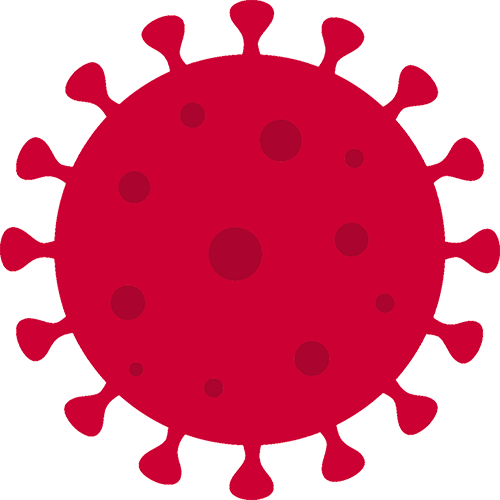 COVID-19 Policies for Face-to-Face Classes
COVID-19 Policies for Face-to-Face Classes
Please visit our policies page for the latest information.
 Pre-registration/Walk-Ins
Pre-registration/Walk-Ins
Walk-in Registration will be available for $145. No lunch options will be available for purchase onsite. You are welcome to bring your own lunch.
 Campus Parking Policy
Campus Parking Policy
All visitors must register their vehicles ONLINE to park on campus. If you require handicapped parking, please be sure to check that off on your registration. Please follow the guidelines below. Failure to comply with these policies may result in a citation.
- A link to register your vehicle will be provided in your course confirmation email. Please be sure to complete this important step prior to traveling to campus.
- When you park on campus, be sure that your license plate is unobstructed and visible from the driving aisle.
- All Rutgers faculty/staff/students must use their regular Rutgers permit and park in the nearest lot assigned for their permit type.
 Email Requirement
Email Requirement
A unique email address is required for each registrant to register and access our courses.
- If this is your first time registering with us, please provide your own unique email address when registering; do not provide an email address that you share with co-workers.
- If you have previously taken classes with us and have used an email address that you share with your co-workers or supervisor, your account must be updated with a unique email address. To do this, please send an email to us at registration@njaes.rutgers.edu stating that your email address needs to be changed and include:
- Your full name
- The shared email address that needs to be changed
- Your unique email address
- A phone number where you can be reached if we have any questions
 Cancellations and Substitutions
Cancellations and Substitutions
A $35 cancellation fee applies for this course. Substitutions are permitted. View our cancellation policy.
Help Those in Need
Rutgers Home Gardeners School invites you to bring non-perishable, unopened animal food (cans or boxes) to the event. The Scarlet Paws Animal Welfare Network will be onsite to collect your charitable donations. Thank you for your generosity!

Register Now
Pay with Credit Card:
Pay with Check or Money Order:
Give the perfect holiday gift for gardening enthusiasts!
Program Questions? We’re Here to Help!
If you have any questions about Home Gardeners School, please don’t hesitate to reach out to us.

Program Coordinator: Olga Welsh
848-932-7315
ow31@njaes.rutgers.edu
For registration assistance, please contact our Registration Department at 848-932-9271, option 2 or email registration@njaes.rutgers.edu.

